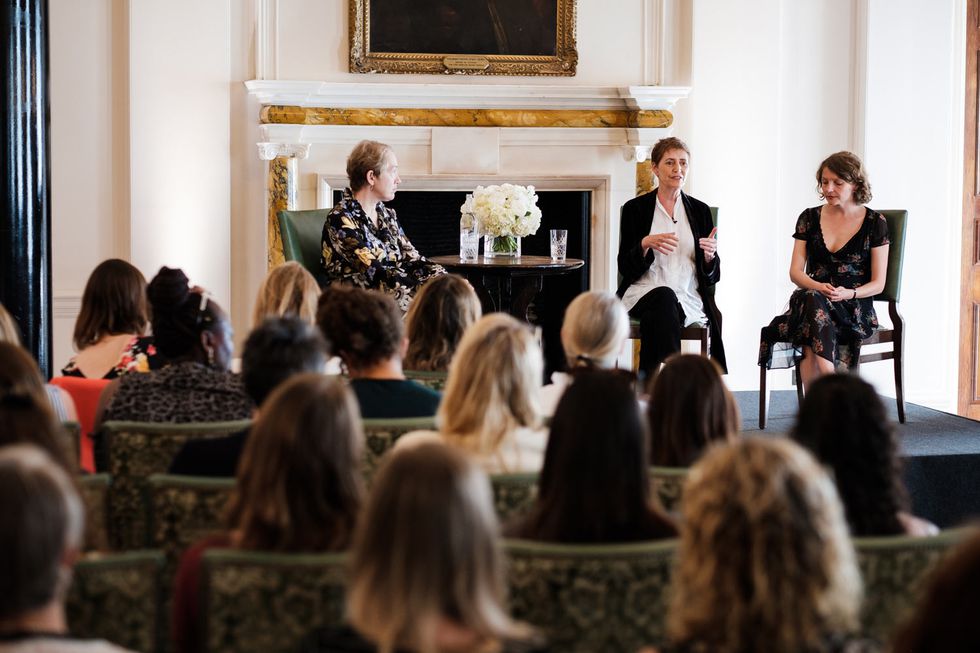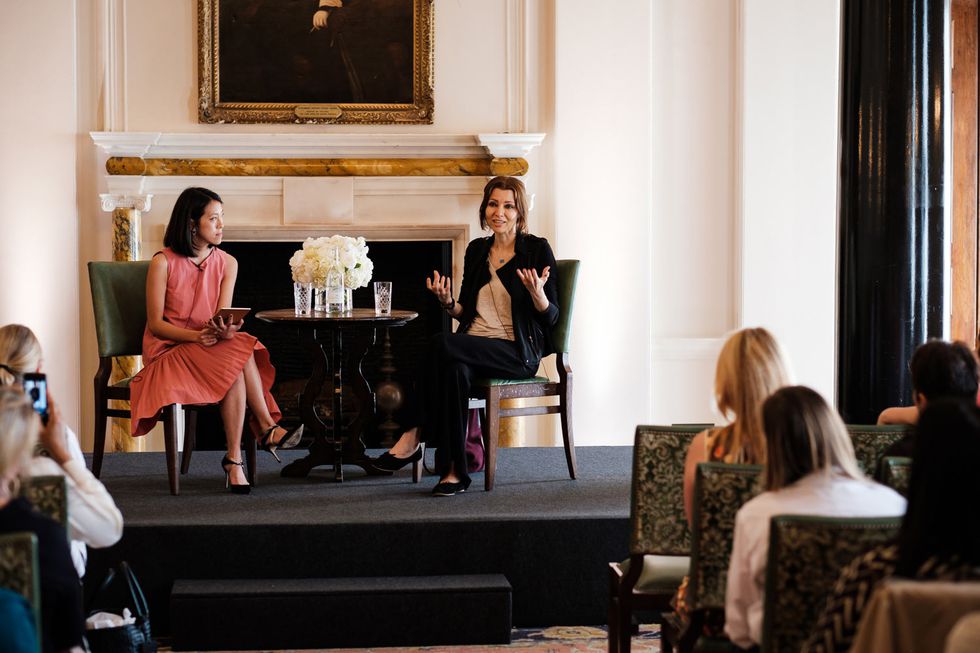
My first foray back into the “real world” after almost two months of living in a new baby haze was to the inaugural Harper’s Bazaar Literary Salon, held at the beautiful London hotel, The Ned, on Sunday 20th May.
Unable to leave the baby because I still fed her every few hours, I traversed the underground with her strapped to my chest. Her hot breath fluttered against my skin as I eased my way through the crowds I had once felt so at home in as a student. A station guard waved me over and pulled aside the grill separating the bustling tube station from the quiet passageway with the lifts, and took me up himself. “Is this your first time out and about in London with the baby?” he asked. I nodded. “You looked a little vulnerable there,” he said by way of explanation for his kind gesture. I was a little taken aback, not realising that my face was quite as transparent as all that, but I was grateful nonetheless.
I met my mother (ever my biggest creative cheerleader) for lunch before the talk we had booked to attend (“How to Get Your First Book Published”). She held the baby while I scribbled notes in my journal, and then took her out when she got a bit noisy so that I could listen to the rest of the talk. By the end of our session, finding ourselves excited and inspired and reluctant to leave (and the baby relatively compliant), we were able to spontaneously attend the next talk—an interview with the brilliant Turkish novelist, Elif Shafak.
The whole day felt charmed, as if some lovely magic was at work to reassure me that yes, you can—and should—continue to do the things that light up your soul after having a baby. That motherhood and writing, while a hard duo to juggle sometimes, aren’t incompatible; a message that is very close to the heart of Shafak herself, as it happens.

Left to right: Justine Picardie, Alexandra Pringle, and Karolina Sutton discussing “How to Get Your First Book Published”. Photo by Oliver Holms for Harper’s Bazaar
Here are a few nuggets from the “How to Get Your First Book Published” session:
- Writing is a craft; it’s not enough to have a great story to tell, you have to practice and hone the skill with as much perseverance and commitment as you would if you were learning to dance a ballet or compose an opera.
- Especially in this day and age when publishers have so many manuscripts to wade through, it’s more important than ever to have an agent to represent you and put your work in front of the right people.
- Writers waste a lot of time submitting their work to the wrong person. There’s a match-making element to the agent-writer relationship; it has to be the right match, and finding someone you really see eye-to-eye with is vital. This relationship could last a lifetime, if you find the right person, so make sure you do your research thoroughly. Check out the acknowledgement pages of a book that you like that is similar in style/content/vision to yours to find out who the author’s agent is—you might want to consider getting in touch with them.
- The better your synopsis, the better your chances of getting published: make sure it’s concise and compelling, and that your first few chapters are totally gripping. Check that your spelling and grammar is all in order, and read your work aloud to yourself to catch infelicities, unintended repetition, etc.
- If you’re submitting fiction, write a full draft before you submit anything to an agent or publisher. If you’re writing non-fiction, it makes sense to talk to an agent once you’ve mapped out your structure and synopsis and written a few chapters, but before you’ve finished, because they might help you to shape the idea.
- Think about why your idea is relevant and needs to be published now. Your first few chapters and synopsis won’t just be read by editors, it will also be read by publicists, the marketing department, and people like that, so think about how it could be sold to your target readership in one clear sentence or paragraph.
- Spend so much time writing—make a daily practice of it—that by the time you do get your debut book published, you’ll already be a very experienced writer. Read a lot, and find a writing group so that you get better at taking feedback and developing your work in response to it.
- Often, how people respond to your work really is a matter of taste, so keep going and don’t get discouraged by rejection; it can be so subjective, and success as a writer is in large part down to finding the right agent to represent you.
- In the age of the internet, the publishing industry has never been as democratic or open as it is today. There are so many great opportunities to find and cultivate your audience online with a blog or social media presence. Many people make such a success of self-publishing that they then land agents and book deals later down the road because they have proved that there is a hunger for what they do.

Left to right: Helena Lee and Elif Shafak. Photo by Oliver Holms for Harper’s Bazaar
A few inspiring thoughts from author Elif Shafak:
- To be successful in what they do, writers need to be really good listeners.
- Everybody brings their own gaze to a story; it’s a writer’s job to ask questions, and the reader’s job to bring answers. Don’t write as if you have all the answers.
- Use your writing to create space and give voice to the invisible, the side-lined, the marginalised.
- You must learn to give equal weight to the different (and often conflicting) voices within you.
- These days there’s lots of focus on information, but not enough on handling that information with wisdom.
If you’d like to receive monthly creative writing inspiration and join an international community of people working to make time for creative writing in their every day lives, sign up to my newsletter, The Writing Habit.




